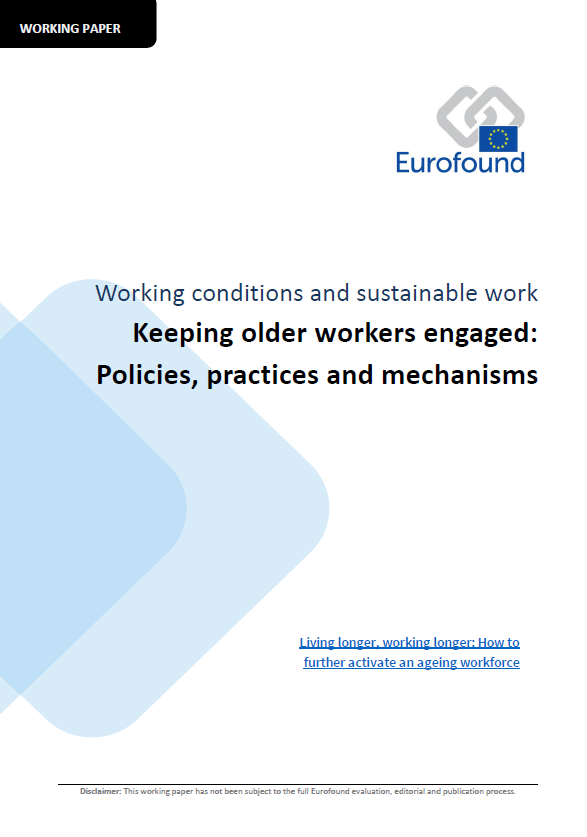EU context
Malgré l’augmentation substantielle des taux d’emploi chez les personnes âgées au cours de la dernière décennie dans de nombreux pays de l’UE, le rapport conjoint sur l’emploi de la Commission européenne (de 2017) met en évidence la possibilité d’augmenter davantage encore ces taux. En 2016, le taux d’emploi des personnes âgées de 55 à 64 ans dans l’UE s’élevait à 55,3 %, contre 66,6 % pour la tranche d’âge des 15-64 ans dans son ensemble. C’est chez les femmes que l’augmentation a été la plus marquée.
Le socle européen des droits sociaux offre un cadre permettant d’aider les marchés du travail à s’adapter aux nouveaux défis tout en promouvant l’équité et la solidarité entre les générations. Il insiste sur le droit des travailleurs à un environnement de travail adapté à leurs besoins professionnels et qui leur permette de prolonger leur participation au marché du travail. Par ailleurs, le récent accord autonome signé par les partenaires sociaux européens sur le vieillissement actif et une approche intergénérationnelle entend aider les personnes âgées à participer activement au marché du travail et à y rester plus longtemps.
Études d’Eurofound
Eurofound possède une solide expérience des questions liées au vieillissement de la main-d’œuvre. Les études menées depuis les années 1990 ont porté en particulier sur la participation au marché du travail, le rendement au travail, les conditions de travail et les préférences en matière de temps de travail des travailleurs âgés dans le contexte de l’évolution démographique en Europe. Les études ont également été axées sur le soutien public et les initiatives prises par les entreprises pour favoriser l’emploi des travailleurs âgés. Elles ont porté sur les travailleuses plus âgées et mis en évidence l’augmentation des taux d’emploi de ce groupe et leur proportion grandissante dans la main-d’œuvre, en particulier dans le groupe des 55-64 ans.
Données issues des enquêtes
Les principales enquêtes d’Eurofound fournissent une série de données relatives à la situation des travailleurs âgés. La sixième enquête européenne sur les conditions de travail (EWCS) examine la situation des travailleurs âgés en ce qui concerne différentes dimensions de la qualité de l’emploi. Bien que les travailleurs âgés risquent moins de perdre leur emploi que les jeunes, les données montrent qu’ils estiment que, s’ils se retrouvaient au chômage, ils ne trouveraient pas un nouvel emploi offrant le même niveau de rémunération et rencontreraient même des difficultés à réintégrer le marché du travail.
Une étude fondée sur la cinquième enquête européenne sur les conditions de travail (EWCS) d’Eurofound examine les caractéristiques des travailleurs âgés et du travail à différents âges ainsi que les facteurs qui garantissent un travail durable pour une main-d’œuvre vieillissante: de bonnes conditions de travail, un bien-être physique et mental et un équilibre entre vie professionnelle et vie privée.
L’enquête européenne sur la qualité de vie (EQLS) d’Eurofound fournit des constatations liées à l’âge en ce qui concerne les différentes dimensions de la qualité de vie en Europe. Fondée sur les conclusions de la troisième EQLS, une analyse des préférences en matière de temps de travail chez les travailleurs de plus de 50 ans indique que nombre d’entre eux préféreraient travailler moins, même après avoir pris en considération leurs besoins financiers. Combler ces préférences en matière de temps de travail peut permettre aux personnes de travailler plus longtemps, et les encourager à le faire.
Allongement de la vie active
Dernièrement, Eurofound a collaboré avec trois autres agences de l’UE pour passer en revue les environnements de travail adaptés aux personnes âgées en Europe, les enjeux politiques liés au vieillissement de la main-d’œuvre et les solutions innovantes.
De nombreux travailleurs n’ont pas la capacité ou la motivation de travailler jusqu’à l’âge légal de la retraite. Il existe toutefois certaines personnes qui sont à la fois capables et désireuses de travailler après l’âge de la retraite. Eurofound a étudié ce phénomène croissant de la reprise d’un travail après l’âge de la retraite.
Une étude récente s’est penchée sur l’allongement de la vie active grâce aux régimes de retraite flexibles, en mettant un accent particulier sur les régimes de retraite partielle qui peuvent faciliter cet allongement. Les bilans de milieu de carrière peuvent également contribuer à l’allongement de la vie active. Une étude a examiné comment ces bilans peuvent jouer un rôle clé en clarifiant les choix possibles pour permettre aux travailleurs de rester actifs jusqu’à un âge de retraite plus avancé. Elle met en évidence différentes stratégies mises en place par les entreprises pour maintenir en poste la main-d’œuvre vieillissante.
Une autre étude recense les mesures nationales et sectorielles prises par les gouvernements et les partenaires sociaux pour retenir les travailleurs âgés sur le marché du travail, y compris les incitations financières et l’amélioration des conditions. Une étude antérieure avait analysé les mesures en matière de gestion des âges prises avant et après la récession, afin de mettre en valeur les bonnes pratiques adoptées par les entreprises en Europe.
Ressources
























